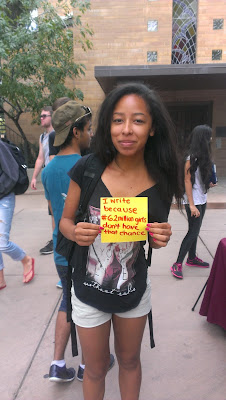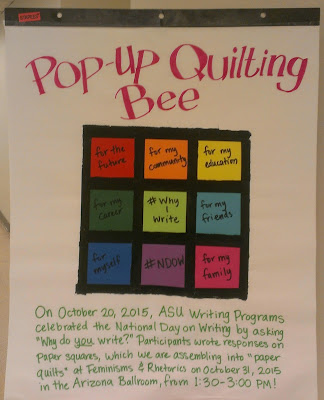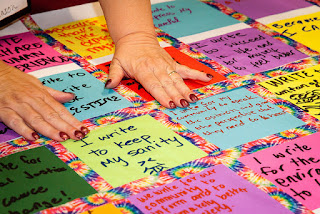This is going to be longish, folks--I've got some catching up to do on my word count. And since I'm having trouble thinking of what to write about, I'm going to do what any self-respecting scholar would do: I'm going to go meta, and write about writing.
The first human writing was primarily numbers, for record keeping.
Wikipedia tells me that the first writing of language occurred in at least two times and places, independently: in ancient Sumer around 3200 BCE, and Mesoamerica around 600 BCE. The Sumerians, humanity's earliest known writers, wrote using a stylus on clay tablets, and their writing was initially used for bookkeeping.
The Egyptians, who may or may not have developed their hieroglyphic writing system due to the influence of the Sumerians, used writing not only for economic but also for religious and military purposes. Semitic workers developed an alphabet in Ancient Egypt around 1800 BCE. These "Proto-Semites" wrote graffiti and "votive texts" on Mount Sinai.
The Ancient Chinese wrote divinatory texts on bones and turtle shells. And the earliest known writers in the Americas, the Maya, likewise initially tended to employ writing for sacred purposes.
Eventually people started using writing not only for economic or devotional purposes, but also to record ideas and poetry. I sometimes wonder whether those early writers ever struggled to think of what to write.
Plato's Socrates (really the only Socrates we know, since he never wrote anything himself) was suspicious of writing. He argued (quite correctly, as it turned out) that writing would destroy memory and cause people to profess knowledge they did not actually possess. Memory and knowledge meant something rather different in oral cultures than they do now, of course. It is true that, if you can write something down, you don't have to commit it to memory--and that a memory recorded externally is qualitatively different from a memory etched in the mind. Our memories are not what they were.
The problem with writing, Socrates said, was that you can't ask it questions--or at least you can, but it can't explain itself; it can only repeat the same words again and again. And that is why it doesn't count as knowledge--to know something means to be able to explain and re-explain how you know it. Writing doesn't "know", it just "is," but it enables people who can read it to pretend to knowledge they haven't "earned"--they haven't worked it out for themselves, but just gotten it from a book. So, with writing, something was lost, but something was also gained.
I wonder how often Plato struggled to find words for his ideas. I wonder how often he struggled to find ideas for his words.
The problem of what to say (or write) and how is one of the two primary concerns of rhetoric (the other is analyzing what's been said and how). Classical rhetoric broke the problem down into five
canons: invention, arrangement, style, memory, and delivery. Scholars continue to argue about which of the canons deserve the most attention, but since I've started this blog, invention has been on my mind.
For ancient rhetoricians, invention was all about the
topoi--the topics, or places to find things. But they weren't really talking about things to write about or places where ideas could be found--such a catalogue, being potentially infinite, could never be completed, and Aristotle, the great systematizer of ancient rhetoric, did something much more clever. His
topoi represent "basic
categories of relationships among ideas". And the ways we can construct relationships among ideas turn out to be rather more manageable.
Anyway. Those who know me, know that I am rarely at a loss for something to
say. But having something to
write seems to be quite another matter. And having something to write about
every day seems positively daunting. Aristotle reminds me that it isn't so much having some
thing to write about, but about making connections.
Audience is another problem. Not only do I have to think about who might be reading this blog, but also who might read it in the future. Like everyone, I have multiple identities: sister, daughter, friend, colleague, scholar, teacher, student, Latter-day Saint, woman, Latter-day Saint woman (yes, those are three distinct, though never separate identities), Doctor Who fan, roommate, among others. Many of those identities overlap, but they are sometimes in tension with one another (scholar and Latter-day Saint, for instance, are often perceived by others as being in tension, if not generally by me--but that perception itself generates a tension). And new identities arise over time.
When I write this blog, which "me" am I? And which of "you" am I writing to? Perhaps, in writing this, I am calling forth new identities for myself and my audience. All of these identities and the tensions between them are, of course, sites of rhetorical invention--they represent potential relationships among ideas, as well as actual relationships between people.
The stakes are not trivial. It may be that I will never have more than a handful of readers. Perhaps only family and friends, but potentially also future employers, colleagues, federal agents, and the odd web-crawling AI. I hope, at any rate, that my readers will be friendly, or at the very least, kindly disposed toward the "me" that is embodied in the words that I write.
The full title of this blog, generously supplied by my good friend Nancy, is "Rebeccaland: where everything is just like it is in my head." That title was a bit too long for Blogger to display properly, so I shortened it, but in shortening it, something was lost. Indeed, I've been meditating on this very interesting title for the last few days. Nancy loves layers of meaning--I mean, loves them even more than I do, and that's saying a lot. She's a Joyce scholar.
The title is both the product of invention, and a new site of invention. It is the product of the particular relationship among the ideas that I have of Nancy and she has of me and each of us have of what blogging is or can be--among other things. It also represents the potential range of topics this blog might contain, and suggests a certain attitude toward them (an attitude which is tied to that complex of interpersonal perceptions I just talked about).
Basically, I think that this blog isn't so much going to be like the inside of my head (which is really full of a great many things that ought best to stay inside my head; they won't stand for being shoved onto the front stage of a blog), as it is like what Nancy thinks the inside of my head is like--a bit like Disneyland, only without the commercialism, and with more books. So, like a cross between Disneyland and a library. Or, to put it another way, it will be full of random happy geeky things with a generous side of pondersomeness (and the odd neologism sprinkled in here and there).
Word Count
Friday: 221
Saturday: 1893
Running total: 3815
Day 3 target: 5001


















